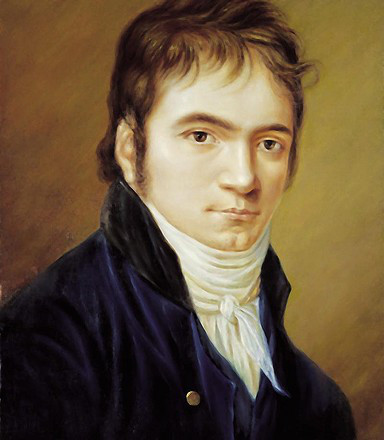In the previous post in our series ‘Exploring the Great Composers’, we talked about Mozart. Another name that is perhaps just as famous in the world of music, is that of Beethoven. The author of many great works, Ludwig Van Beethoven made an unforgettable impression on the world in general, and the the world of music in particular.
A number of his pieces have made it into ‘household name’ status (For Elise and the first movement of the Moonlight Sonata), with themes that are recognized even by people who don’t consider themselves fans of the music called ‘classical’.
Read on to learn all about Beethoven’s life and work!
Ludwig van Beethoven was born in Bonn, Germany in 1770 (December), the same year that William Clark (of the Lewis and Clark Expedition) was born, and the year in which the Boston Massacre occurred.
Showing musical promise as a child, Beethoven was taught violin, viola, horn, and keyboard, by his father and other local musicians, including Christian Neefe, the court organist. Young Ludwig filled in for Neefe, and at age twelve, played harpsichord (an early keyboard instrument and predecessor to our piano) for the court.
Beethoven must have been grateful for Neefe’s instruction, as he once wrote to Neefe: ‘I thank you for the advice you have very often given me about making progress in my divine art. Should I ever become a great man, you too will have a share in my success.’
At seventeen (in 1787 – the year when the French Revolution started to *take place*), Beethoven travelled to Vienna for musically enrichment, and may have taken some lessons with Mozart.
Studies With Haydn in Vienna
Because of unfortunate family circumstances, Beethoven was forced to return to Bonn, where he spent some years playing viola for the court. He wrote music, went to the Zehrgarten tavern (a place where intellectuals met), and studied philosophy at Bonn University.
After Franz Joseph Haydn passed through Bonn, he invited Beethoven to come to Vienna to study with him. So Beethoven traveled to Vienna where he studied counterpoint with Haydn, performed as a pianist, and composed.

a portrait of Ludwig Van Beethoven
Later Life in Austria
Beethoven’s Austrian life continued, and he continued to compose.
It is well-known that the great composer developed deafness. The deafness was most pronounced in the left year. Beethoven lamented the hearing problem. He once wrote in a letter: ‘the humming in my ears continues day and night without ceasing. I may truly say that my life is a wretched one…When at the theater, I am obliged to lean forward close to the orchestra, in order to understand what is being said on the stage…Often I can scarcely hear anyone speaking to me; the tones yes, but not the actual words; yet, as soon as anyone shouts, it is unbearable.’
What an unimaginable problem for a professional musician, especially one of Beethoven’s caliber, to have! By 1818 the composer was completely deaf.
Between the years of 1803 and 1812, Beethoven composed many great works including the Third Symphony, and the ‘Appassionata’ and ‘Waldstein’ sonatas.
The Gift of Art
Beethoven gave the world the gift of his profound music, including many works of incomparable power. For the pianist and lovers of the piano, he wrote glorious piano concertos and innovative piano sonatas. His brilliance and emotional and spiritual depth resulted in a catalog of music expressing all the great range of human experience.


